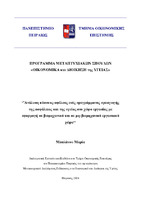Ανάλυση κόστους-οφέλους ενός προγράμματος προαγωγής της ασφάλειας και της υγείας στο χώρο εργασίας με εφαρμογή σε βιομηχανικό και σε μη-βιομηχανικό εργασιακό χώρο
Α cost-benefit analysis of an occupational health and safety programme with application to both industrial and non-industrial setting

View/
Keywords
Εργατικά ατυχήματα ; Επαγγελματική υγεία ; Ασφάλεια ; Χώροι εργασίας ; Βιομηχανικοί χώροι εργασίας ; Κόστη ατυχημάτων ; Μελέτη κόστους οφέλουςAbstract
Background: workplace accidents (fatal or non fatal) and occupational diseases act as
a significant barrier to global social and economic prosperity. For this reason, the
present study conducts a cost benefit analysis in both industrial and non- industrial
workplaces.
Objectives: the aim of this study is to assess the costs and benefits of implementing
occupational health and safety (OHS) measures in order to determine whether such
interventions are worth implementing.
Methodology: at a research level, the proposal of the study was addressed by collecting
data from the records of a Greek company. Subsequently, the costs and benefits were
quantified and future discounted to determine whether the measures are economically
beneficial and sustainable for both the businesses and society as a whole. Finally, a
sensitivity analysis was conducted to examine the extent to which the results are
affected by external parameters. All calculations were performed using Εxcel.
Results: the analysis revealed that implementing they are both programme is a
worthwhile investment as the benefit/cost (B/C) ratio was significantly greater than one,
as well as benefits for all three companies. Specifically, the B/C ratio for company was
1.66, for company B was 2.89 and for a company C was 3.25. The net benefit for
company A was 30, 927.31 €, for company Β was 68,062.66 € and for company C was
48,487.47€. Regarding the sensitivity analysis, the only parameter affecting their results
was the investment costs
Conclusions: the number of accidents, the absenteeism and the expenses related to
health and business operations significantly decreased after the implementation of
workplace health and safety measures. Therefore, these measures are economically
efficient and sustainable benefiting both businesses and society as a whole.

